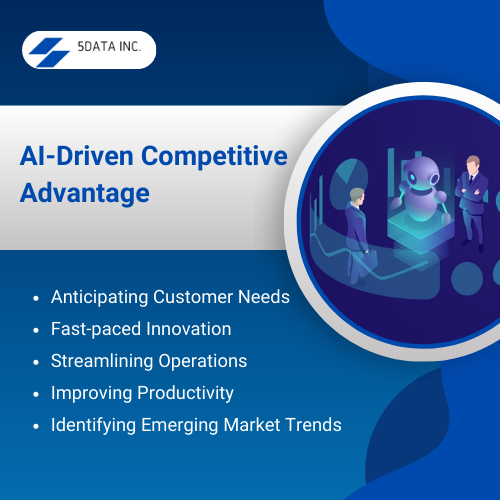We will explore the depths of Artificial intelligence (AI) in digital commerce strategies and integrate AI and AI adoption in traditional marketing strategies and e-commerce businesses; we will also analyze user behavior, customer relationships, business strategies, e-commerce platforms, data-driven decisions, and more!
Key Takeaways
- AI and automation transform digital commerce, predicting behavior and boosting engagement.
- Ethical AI practices foster trust and credibility in business operations.
- AI-driven strategies spur innovation and efficiency, driving competitive advantage.
- Personalized experiences and streamlined operations are key outcomes of AI integration in commerce.
AI Insights for Customer Understanding
A major advantage of integrating AI into digital commerce strategies is the ability to gain deep insights into customer behavior, customer loyalty, and customer lifetime value. Let us learn more about it:
Machine Learning Analysis: AI’s machine learning algorithms analyze extensive data to identify patterns and predict future trends, allowing businesses to customize offerings for their target audience.
Microscopic Understanding: Understanding customer behavior at a granular level enables businesses to optimize marketing campaigns, enhance recommendations for products, and elevate the overall shopping journey.
Predictive Modeling and Data Analysis: AI algorithms excel at analyzing vast customer data, including purchase history, browsing behavior, social media interactions, and demographics. This analysis uncovers valuable insights and trends that human analysts may overlook.
Anticipating Future Behaviors: Predictive modeling capabilities enable businesses to anticipate future customer behaviors and preferences, empowering them to address customer needs and deliver personalized experiences proactively.
Personalized Email Marketing & AI Engagement
In today’s digital marketing landscape, personalized communication is the cornerstone of customer retention strategies for an e-commerce business. Here’s how businesses leverage AI and data-driven personalization to enhance customer engagement, enabling businesses to:
AI-Powered Interaction: Personalized email marketing campaigns and AI-powered chatbots enable businesses to engage customers on a personal level. These tools deliver tailored recommendations and content based on individual preferences and past interactions.
Automated Customer Support: Natural language processing facilitates automated customer inquiries, real-time issue resolution, and seamless shopping experiences across multiple channels.
Data-Driven Personalization: Data-driven decisions are the outcome of data-driven personalization. By analyzing customer data like browsing history, purchase history, demographics, and engagement metrics, businesses segment their email lists and craft highly relevant messages.
Advanced Personalization: Beyond addressing customers by name, businesses can offer personalized product recommendations, exclusive offers based on past purchases, and curated content aligned with specific interests and preferences.
Ethical AI & Human-Centric Approach
While AI and automation offer immense potential for improving business outcomes, ethical considerations and a human-centric approach are paramount. Let’s delve into these aspects:
Transparency in AI Usage: Businesses must maintain transparency regarding the use of AI algorithms and automated systems. It includes being clear about data collection, processing methods, and analysis techniques. Transparency fosters trust and empowers customers and stakeholders to make informed decisions.
Fairness and Accountability: Ethical AI practices require businesses to ensure fairness in their algorithms and establish mechanisms for accountability. It involves addressing biases, errors, and unintended consequences while using AI responsibly. Accountability measures are crucial for maintaining trust and upholding ethical standards.
Human-Centric Approach: Amidst technological advancements, businesses must prioritize a human-centric approach. It means considering the impact of AI on individuals, communities, and society as a whole. A human-centric approach ensures that technology serves human needs and values while respecting privacy, autonomy, and diversity.
Building Trust: Transparency, fairness, and accountability are key pillars in building trust with customers and stakeholders. By demonstrating ethical practices and a commitment to human values, businesses can navigate the complexities of AI integration while maintaining trust and credibility.

AI-Driven Competitive Advantage
In today’s hyper-competitive marketplace, businesses must innovate and adapt to maintain a competitive edge. Here’s how AI-driven strategies drive competitive advantage:
Identifying Emerging Market Trends:
- AI enables businesses to identify emerging market trends swiftly, allowing for agile decision-making and proactive innovation.
- Machine learning algorithms analyze market data, customer feedback, and competitor strategies to uncover unmet needs and opportunities.
Anticipating Customer Needs:
- AI-powered tools anticipate customer needs by analyzing customer behavior, preferences, and interactions.
- It enables businesses to tailor offerings, enhance customer experiences, and remain ahead of evolving customer demands, giving tangible benefits.
Fast-paced Innovation:
- AI fosters innovation by facilitating the exploration of new ideas and the development of new products.
- AI-powered generative models assist in product design, content creation, and creative brainstorming, driving innovation that sets businesses apart from competitors.
Streamlining Operations and Improving Productivity:
- Integrating AI into business processes streamlines operations, improves productivity, and nurtures a culture of continuous improvement.
- This efficiency translates into faster time-to-market, better resource utilization, and improved overall performance.
AI-Enhanced Business Operations
AI technologies are revolutionizing not just customer-facing aspects but also backend operations in digital commerce. Here’s how AI integration enhances business operations:
Efficient Inventory Management: AI-powered systems automate inventory management tasks, ensuring product availability and minimizing stockouts. This efficiency is crucial for e-commerce businesses to maintain a seamless supply chain.
Process Automation and Optimization: AI automation streamlines processes by automating repetitive tasks and optimizing workflows. Techniques like Robotic Process Automation (RPA) automate manual tasks like document processing and data entry, freeing up employees for higher-value activities.
Data-Driven Decision-Making: AI-driven tools enable data-driven decision-making by analyzing workflows, identifying improvement opportunities, reducing errors, and enhancing overall efficiency across the organization.
Robotic Process Automation (RPA): RPA technologies automate manual tasks like data entry and invoice reconciliation, allowing businesses to maintain structure and efficiency while allocating high-value tasks to employees.
Emerging Trends in AI & Digital Commerce
As technology rapidly evolves, the future of digital commerce presents exciting possibilities. Here are the emerging trends and applications businesses can expect:
Chatbots and Voice-Enabled Commerce:
- Voice-enabled commerce, powered by AI-driven virtual assistants like Amazon’s Alexa and Google Assistant, will become increasingly prevalent.
- Voice commerce allows customers to make purchases, place orders, and access information using natural language commands, offering a convenient and hands-free shopping experience.
Augmented Reality Systems:
- AR and VR technologies will play a growing role in enhancing the digital commerce experience.
- AI-driven AR applications will enable customers to visualize products in their real-world environment before purchasing, reducing returns and enhancing the online shopping experience.
- AI-powered VR experiences will immerse customers in virtual environments, allowing them to explore products and interact with brands in engaging ways, driving higher engagement and conversion rates.
Generative AI for Content Creation:
- AI-powered generative models will be used extensively to create content for digital commerce, including product descriptions, marketing copy, and multimedia assets.
- Generative AI algorithms, such as OpenAI’s GPT models, can generate human-like text, images, and videos based on input data and prompts.
- Businesses will leverage AI-generated content to streamline content creation processes, scale production, and deliver personalized experiences to customers at scale.
By keeping ahead of these emerging trends and embracing innovation, businesses can successfully navigate the digital age, leading to growth and profitability in a highly competitive environment. A renowned Software Application Development Company continuously seeks to advance technologically and design products.
Conclusion
In conclusion, harnessing the power of AI and automation is essential for businesses looking to thrive in the digital commerce landscape. By leveraging AI tools, machine learning algorithms, and automation technologies, businesses can gain valuable insights, streamline operations, and deliver personalized experiences that allow customer engagement and loyalty.
Collaborating with a top application development software company can enhance the integration of AI and automation in everyday applications.
FAQs
What is AI, and how is it used in digital commerce?
Artificial Intelligence refers to the application of human intelligence in machines, making them perform tasks that require human intelligence, like learning, problem-solving, and decision-making.
How does AI-powered personalization benefit digital commerce businesses?
AI-powered personalization enables businesses to deliver tailored experiences, promotions, and recommendations to individual customers based on their preferences, behaviors, and context.
What are some examples of AI-driven strategies in digital commerce?
Examples of AI-driven strategies in digital commerce include:
- Personalized product recommendations.
- Automated customer service via chatbots.
- Predictive analytics for demand forecasting.
- Dynamic pricing optimization.
- AI-powered content generation.
What are some future trends in AI and digital commerce?
Future trends in AI and digital commerce include hyper-personalization, voice commerce, augmented reality (AR) and virtual reality (VR), autonomous commerce, AI-generated content, blockchain and AI integration, and ethical AI and responsible innovation.

